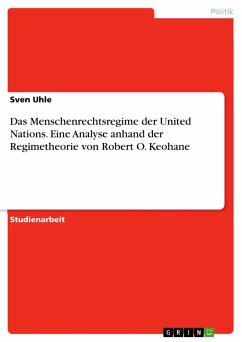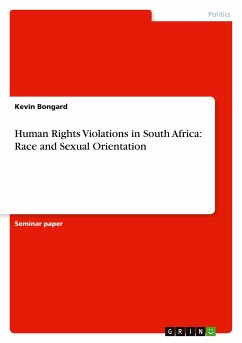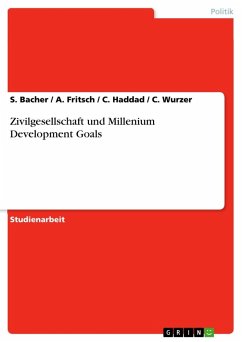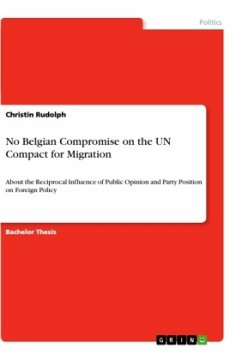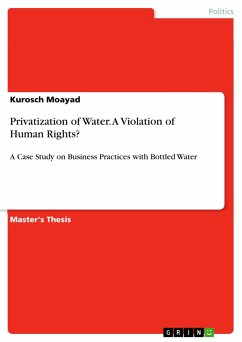
Privatization of Water. A Violation of Human Rights?
A Case Study on Business Practices with Bottled Water
Versandkostenfrei!
Versandfertig in 1-2 Wochen
47,95 €
inkl. MwSt.

PAYBACK Punkte
0 °P sammeln!
Master's Thesis from the year 2015 in the subject Politics - International Politics - Topic: Public International Law and Human Rights, grade: 80 von 100 (very good), Ruhr-University of Bochum, course: Criminal Justice, Governance and Police Science, language: English, abstract: Nach der thematischen Einführung befassen sich die Hauptkapitel mit der Ressource Wasser, die Entstehung des Menschenrechts auf Wasser und die Auswirkungen durch die Privatisierung des Wassers. ----------The purpose of this Master's thesis was to examine weather the human right to water is violated or enhanced by wate...
Master's Thesis from the year 2015 in the subject Politics - International Politics - Topic: Public International Law and Human Rights, grade: 80 von 100 (very good), Ruhr-University of Bochum, course: Criminal Justice, Governance and Police Science, language: English, abstract: Nach der thematischen Einführung befassen sich die Hauptkapitel mit der Ressource Wasser, die Entstehung des Menschenrechts auf Wasser und die Auswirkungen durch die Privatisierung des Wassers. ----------The purpose of this Master's thesis was to examine weather the human right to water is violated or enhanced by water privatization. A special focus is placed on the commercialisation of bottled water as it became an omnipresent beverage around the globe. Whereas for some bottled water represents a luxury live-style commodity, it is a life saving remedy for others, suffering from water scarcity. In this context, the business practices of the multinational enterprises Coca-Cola Company and Nestlé S.A. are examined. This work exclusively uses open sources to obtain a comprehensive view and to analyse the proponents' and opponents' arguments with regard to the respective business practices. After giving an overview of the introduction, the main chapters deal with the resource water, the genesis of the human right to water and the effects of water privatisation. Table of ContentsAbstractList of TablesAcronyms & Abbreviations1.Prologue2.Introduction2.1.Aim of the Study2.2.Resent State of Research Literature/Sources2.3.Research Approach3.Water3.1.Water - a Basic Need3.1.1.Where do we have water3.1.2.Why do we need water3.1.3.Who uses most water3.2.Definitions of Water3.2.1.Safe and drinking water3.2.2.Bottled water3.3.Water and Life in Human Dignity3.3.1.Human dignity3.3.2.Water as Millennium Development Goal4.Privatization of Water4.1.Water as a Commodity4.2.Development of Bottled Water Market4.3.Bottled Water4.3.1.Facts4.3.2.Critique5. The Human Right to Water5.1.Introduction5.2.Water on the International Agenda5.3.Water - a Human Right5.3.1.Human Rights in General5.3.2.The Human Right to Water5.3.3.The Human Right to Water - Challenges5.4.The Human Right to Water and Responsibilities5.4.1.Guiding Principles on Business and Human Rights5.4.2.Global Corporate Initiatives6.Cases6.1.Coca-Cola Company6.1.1.The Company6.1.2.Coca-Cola Company and Bottled Water6.1.3. Coca-Cola Company's Bottled Water Business Practices &Human Rights6.1.4.Case Studies6.2.Nestlé S.A. 6.2.1.The Company6.2.2.Nestlé S.A. and Bottled Water6.2.3. Nestlé S.A.'s Bottled Water Business Practices & HumanRights6.2.4.Case Studies7.Conclusion




